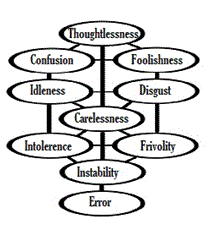Lucifer
llyh
הילל
 As the
scripture implies, the
light within the Light Bearer diminished. There’s an additional window
to this dark aspect of the narrative; for the letters of Lucifer’s
feared name contribute to scripture’s negative savor. By etymology,
“Lucifer” can be read as “the
h
weeping, the howling lly.”
It speaks of remorse. However, the covering cherub wasn’t accursed. He
was given a way of escape; for he would live and die after the manner of
men: sharing their joys, sorrows, expectations and disappointments, but
also sharing in their promise. HaShem’s mercy is without end.
As the
scripture implies, the
light within the Light Bearer diminished. There’s an additional window
to this dark aspect of the narrative; for the letters of Lucifer’s
feared name contribute to scripture’s negative savor. By etymology,
“Lucifer” can be read as “the
h
weeping, the howling lly.”
It speaks of remorse. However, the covering cherub wasn’t accursed. He
was given a way of escape; for he would live and die after the manner of
men: sharing their joys, sorrows, expectations and disappointments, but
also sharing in their promise. HaShem’s mercy is without end.
When
faced with judgment bringing loss, some are despondent and distressed
because of lowered energies. Not liking what an ordeal shows them of
themselves, they lapse into depression, becoming haunted by fleeting
impressions of consequences that may not actually arise. Human instincts
are peremptory, and reversals often trigger downward spirals fueled by
regret. When overmatched, men look for diversion. What they might do
differently is of no great concern, so long as it gives a moment of
respite.
In
depression, even
hitting bottom brings no lasting relief; for victims are smothered by
paranoia disguised as perception. Imploding under the pressures of
anxiety, they panic at the edge of calamity, locked in fixed-lens
preoccupation about the most minute details of their peril. In frantic
hope of relief by this or by that, they cling to sanity by tabulating
the data points of their dismay, as in a fog. When life moves on and
they survive, they’re left stranded with poor footing in sandy marshes,
whimpering because they’re marooned, alone. In despair, they tuck their
minds into shallow thoughts, as in a shell, burying their potential in
idleness. Because reality is so difficult, they steel themselves with
resolutions for just getting by, in a parody of real life.
 A
realm in which all are One is beyond consideration of such
as are enslaved by depression. Their souls are incapable
of seeing what is obvious to any who is able to pursue
the rewarding focus on essence. Defeated, the
depressed are lost: strangers, even to themselves.
Unable to entertain ideas without projecting personal
bias, their minds find no way of escaping quarantine.
A
realm in which all are One is beyond consideration of such
as are enslaved by depression. Their souls are incapable
of seeing what is obvious to any who is able to pursue
the rewarding focus on essence. Defeated, the
depressed are lost: strangers, even to themselves.
Unable to entertain ideas without projecting personal
bias, their minds find no way of escaping quarantine.
Imprisoned by their own thoughts, they assume the
self-indulgent cast of the narcissist.
Closed
systems,
they think of themselves as aliens, and
they
face their torment in isolation; for their tenuous affiliations
afford them little sympathy; and they struggle with hostility, fearing
that they will forever be just one concept short of what is needed for
resolution and acceptance. If pressed about what that thing might be,
they would not be capable of answering.
Because
they face dead ends at every turn in every context, they engage in all
manner of twisted, tunnel-visioned reasoning, hoping to discover a
hidden door that just might provide fulfillment of their stop-gap goal
of escape; but unable to find it, they wallow under the whiplash tyranny
of guilt for falling short, and they do fall short; for they have
yet to discover that
regret is
not repentance.
A record
of Lucifer’s reaction to the judgment against him isn’t given, but his
fall was great, indeed. He had been perfect in everything—spectacular!
approved!
He had satisfied all required of him until a single detail surfaced, but
that stain of iniquity—if stain it was—could not have been a result of
some flaw intrinsic to his character. He had been positioned and
approved as the covering cherub. The light of
hla
was his to bear unto all in heaven and upon earth. He had enjoyed
knowledge of perfection by every consideration in all his ways; and now,
it was gone!
The
mystery of iniquity had been unknown to him or by him until it was
discovered within him; and when it was discovered, his fall was
immediate and imperative because, as covering cherub, he held intimate
contact with everything and every being in all realms. Oversight was
among his duties, and he therefore served in a position through which he
could infect all things gathered beneath his wings, and everyone in
heaven or on earth could be exposed to iniquity by reason of his
shortcoming. He must have understood that, if shortcoming it truly had
been. Regardless, the scripture does not report a complaint. Like a
sheep before the shearer, he opened not his mouth.
As
covering cherub of heaven and earth, Lucifer was perfect until he was
not. Should we understand, then, that the great angel made some kind of
mistake? Had he secretly harbored a core wickedness that had festered
within him until it came to a head, drawing God’s attention and
reaction? Had Lucifer rebelled? Was rebellion even possible for the
covering cherub, considering that his creator had affirmed his faultless
performance in all his ways until the instant his iniquity suddenly
appeared?
If
Lucifer had been successful in keeping a measure of iniquity hidden from
the sight of the father, it wouldn’t speak well of
la;
for even after its discovery, Lucifer was extolled for perfection in
all his ways, which would then imply that his “perfection” had been
a titanic duplicity! Perhaps that blanket praise of his perfection was
just an overblown maxim, a way of patting the unfortunate fellow on the
back before showing him the door? I think not. If that were so, it would
paint hla
with a very black brush.
| Iniquity, its Discovery | ||
| site |
book |